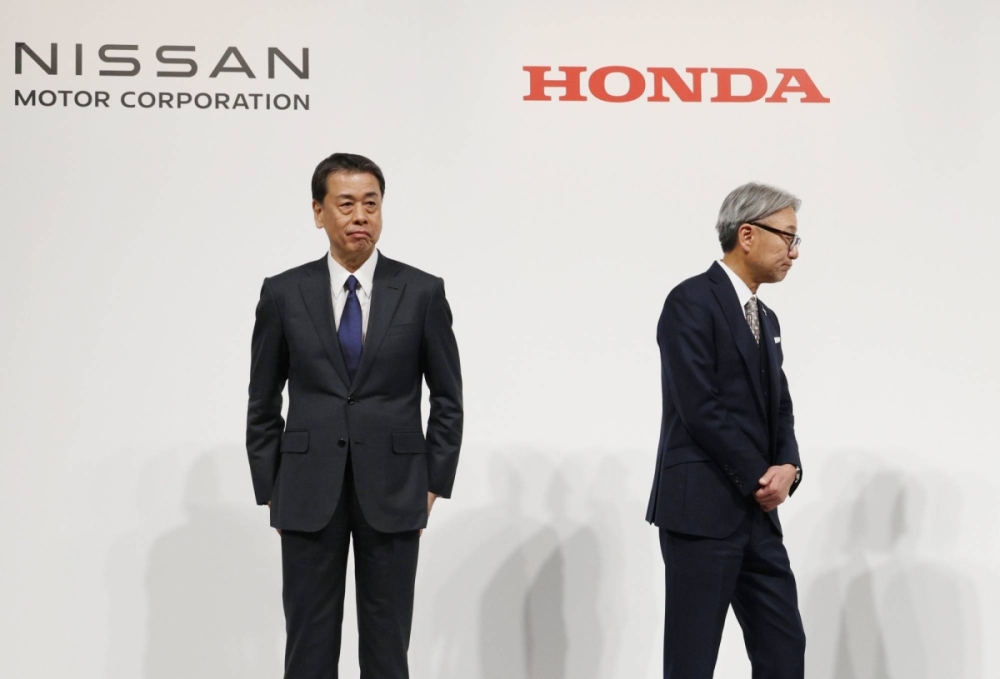Honda and Nissan cancel megamerger after weeks of negotiations
Following weeks of talks after Nissan Motor President Makoto Uchida and Honda President and CEO Toshihiro Mibe's December announcement of a possible merger, the two automakers confirmed on Thursday that the deal is officially off. | Jiji
The megamerger between Honda and Nissan is now officially off following weeks of talks, the two automakers confirmed on Thursday.
“It’s very unfortunate that we could not find the common ground to take a step toward the merger,” said Honda President and CEO Toshihiro Mibe in a news conference.
The automakers explored the deal, which would have created the world’s No. 3 vehicle producer, as a way to reverse their declining fortunes.
Nissan and Honda still intend to work together in areas including software and electric vehicle-related technologies.
Negotiations apparently hit a snag after Honda made a proposal for Nissan to become its wholly owned subsidiary. Nissan rejected the proposal.
The original plan was to establish a joint holding company that would fully own both Honda and Nissan. Honda was expected to pick a leader and a majority of the board members for the joint holding company.
But Mibe indicated that it would be best that Honda has more control to make speedy decisions under "one-governance" structure, so it proposed to make Nissan its subsidiary.
“We confirmed that the merger of the two companies had great potential to bring significant effects in various areas, ranging from platforms, purchasing, research and development and back-office operations,” Mibe said.
"At the same time, we also came to realize that it was necessary to swiftly and decisively implement painful decisions to achieve this."
Nissan thought the best form of the merger was to go with the original plan to establish the joint holding company, Nissan CEO Makoto Uchida said.
“Under the current situation, it is difficult to keep up with competition just by Nissan itself, so we had a serious discussion about the proposal by Honda," Uchida said in a separate news conference on Thursday
“We were unable to have confidence in how much Nissan’s independence will be ensured and whether our potential will be fully brought out if Nissan becomes Honda’s wholly owned subsidiary."
“Both companies concluded that, to prioritize speed of decision-making and execution of management measures in an increasingly volatile market environment heading into the era of electrification, it would be most appropriate to cease discussions and terminate the MOU,” the companies said in the statement in reference to their earlier memorandum of understanding.
Given that Nissan’s market capitalization is just about one-fifth of Honda’s, the merger was widely seen as a move by Honda to save Nissan, which has been struggling.
In the first half of this fiscal year, Nissan’s net profit fell more than 90% mainly due to sluggish sales in the United States and China. Following the disappointing earnings report, the company announced it would cut 9,000 jobs globally.
Mitsubishi Motors, more than a third of which is owned by Nissan, previously said that it wanted to wait and see how the merger talks went before deciding whether to join.
When the three automakers held a news conference in December to announce the possibility of a merger, they said they were aiming to finalize a deal by June and establish a new holding company by the summer of 2026.
If Honda, Nissan and Mitsubishi had gone through with the merger plan, it would have left Japan with just two auto-manufacturing groups. Toyota — the world's largest automaker — counts Daihatsu Motor and Hino Motors as subsidiaries and also has capital ties with Isuzu Motors, Suzuki Motor, Mazda and Subaru.
A major question now is how Honda and Nissan will boost their competitive edge over other traditional and emerging rivals amid rapidly changing auto-tech trends.
Some analysts have said that it will be tough for Honda and Nissan to survive on their own, arguing that Nissan should not have let its pride get in the way of the proposal by Honda to become its subsidiary.
At the same time, some have expressed doubts about whether the two companies would have been able to smoothly merge anyway as their corporate cultures are quite different.
Reports indicate that Taiwan’s Hon Hai Precision Industry has expressed interest in making an investment in Nissan.
In 2019, Hon Hai, which manufactures iPhones and is better known by its Foxconn trade name, said it was making a foray into the EV market.
In 2023, the company recruited Jun Seki, a former Nissan executive, to head its EV business. Media reports have said that Seki is leading the efforts to establish ties with Nissan.
Competition in the auto industry is intensifying with nontraditional players, such as Tesla and BYD, expanding into the business in response to the rise of new technologies, including connected automobiles and autonomous vehicles, as well as to the ongoing process of electrification.







